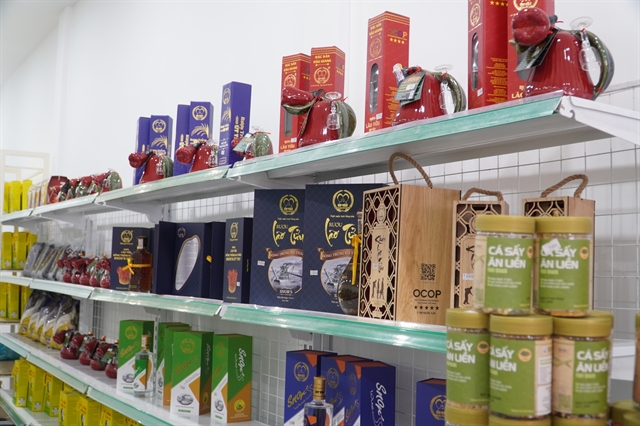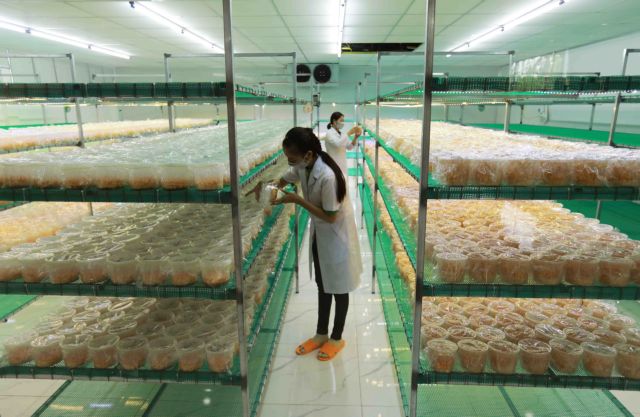 Economy
Economy

 |
| Cordyceps recognised at the 4-star standard at a cooperative in Cần Thơ. — VNA/VNS Photo Vũ Sinh |
HÀ NỘI — One Commune One Product (OCOP) products considered specialities of each locality have encountered challenges finding customers on their home turf.
OCOP, implemented from 2018, is a national programme that seeks to facilitate the development of regional agricultural specialities and rural tourism. The country has a total of 8,689 OCOP products recognised as 3-star standard.
However, firms with OCOP products say it's not easy for them to sell these products as most consumers still do not know what OCOP is or why their prices are higher than those of similar products.
Nguyễn Ngọc Luận, Director of HCM City-based Global Trading Connection Co, told baodautu.vn that about 80 per cent of consumers did not have sufficient information about OCOP products.
Luận's business sells 'Meet More' - a fruit-infused instant coffee product recognised at the 4-star standard, but few customers understand the value of this recognition.
Customers also found it difficult to recognise OCOP products at trade fairs and exhibitions as they're often displayed together with other goods, Luận said.
Meanwhile, to get their products into local supermarkets, businesses had to offer steep discounts. This makes it difficult for small and medium-sized firms with limited capital to access this key distribution channel, according to Luận.
When entering the supermarket, OCOP products are equated with general products. The fact that OCOP products do not have a separate display space decreases their value.
Phạm Thị Thu Hằng, Director of Po Lang Co in Đắk Lắk Province said her company had several products with OCOP certification.
Her firm had difficulties finding distributors and customers as high investment and production costs of certified OCOP products resulted in higher prices, Hằng said.
Lê Văn Cương, a representative of Babyahha Co in the capital city agreed. He said OCOP products were mainly handmade on a small scale, leading to higher production costs.
In addition, small and medium-sized enterprises, cooperatives and households also had to invest in technology, equipment and machinery to ensure the quality of OCOP products.
Finding a way to export
Amid challenges in the domestic market, many businesses have made efforts to find overseas markets for their OCOP products.
Phạm Đình Ngãi, Director of Trà Vinh Farm Co which sells 5-star standard coconut sugar and Sokfarm coconut nectar said his products had won several international certifications. This had helped his firm export to many countries.
Sokfarm coconut nectar products are available in Japan and the Netherlands, he said, adding that his company was seeking new partners in South Korea, the US, France and Germany through attending trade promotion events and international fairs.
For the domestic market, Ngãi said, he would continue to invest in expanding the distribution system and retail channels through e-commerce platforms. The company would also continue to develop new product lines to meet the needs of consumers better, he said.
Meanwhile, Luận said his firm would prioritise investing deeply in product quality. His 4-star OCOP coffee products had been exported to 13 countries including in strict markets such as Japan, the US and the EU.
Luận suggested businesses continue to improve the value and quality of their OCOP goods.
Agricultural experts said that for OCOP products to boost sales, distributors and manufacturers had a common responsibility to build trade and connections to bring goods to consumers.
The role of distributors was important as they know what consumers want and can help guide manufacturers.
Earlier this year, the Ministry of Industry and Trade (MoIT) introduced regulations for the sales of products under the OCOP programme.
The new criteria are in place from now until 2025.
Under the new regulations, OCOP goods in showrooms must achieve a minimum of three stars or higher based on the criteria for evaluating and classifying OCOP products promulgated by the Prime Minister.
Additionally, they must be the province's key, typical agricultural or industrial products or specialities that characterise the region's advantages, as determined by the MoIT.
The OCOP showrooms will be located in areas with dense traffic, such as airports, stations, highway rest areas, commercial centres, supermarkets, tourist attractions, craft villages, industrial zones, and exhibition centres.
The new regulations aim to ensure that OCOP products meet market demands, satisfy customers' preferences, comply with legal requirements, and protect environmental and consumer safety. VNS




